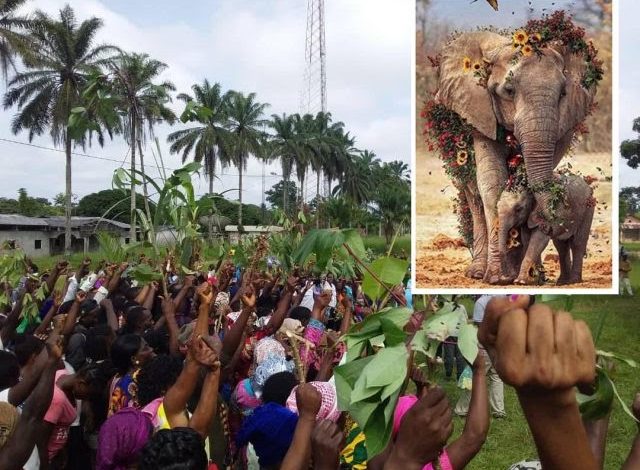4 Persons Arrested As Farmers Protest Farm Destruction By Elephants In Gabon
The four arrested persons in Gabon are believed to be the leaders of the protests.

Four persons have been detained in the Makoukou central prison and 26 others provisionally released, following protests by farmers over the destruction of their farms by elephants in Mekambo, a town in Ogooue-Ivindo province of Gabon.
According to security sources, the 26 persons provisionally released have been sent home to pacify others and bring serenity in the area.
“They are going to appease the populations of Mekambo, re-establish serenity within the Mekembo community and invite the Mekambo people who have gone into the marquis to come back to town,” a security source revealed.
A civil society leader said most Mekambo youths have fled to the bushes to avoid being arrested by gendarmes and soldiers sent to reinforce security in the town.
He said Mekambo right now looks like a ghost town.
The four persons held in prison are said to be the leaders of the protests. One of them is a former policeman who is reported to have opened fire on a vehicle carrying eco-guards.
The three others are being accused of theft. They are said to have broken into an eco-guard station and carted away their work materials including a computer and an air conditioner.
“They eventually brought back some of the materials they stole from the eco-guard station after appeals by notables from the area but they still have to face prosecution for their criminal acts,” a security source revealed.
The Mekambo population, however, feels that the detention of the four individuals violates the appeasement preached by the government and they call for the release of all those detained in prison.
In the last two weeks, Mekambo has been restive as the populations have been accusing the government of protecting elephants that have been destroying their farms instead of protecting the interests of humans who are being robbed of their main source of income which is farming.
A delegation of parliamentarians from the affected constituencies is currently on the ground to try to appease the populations but the people want but government officials to come and explain to them the rationale behind their preference for protecting animals than working for the betterment of the living conditions of the people.
The international environmental non-governmental organisation, Brainforest, recently recommended to the Gabonese government that it should “place man at the centre of its conservation policy” adding that it would gain a lot if it “puts nature at the service of man and not the reverse.”
Support Our Journalism
There are millions of ordinary people affected by conflict in Africa whose stories are missing in the mainstream media. HumAngle is determined to tell those challenging and under-reported stories, hoping that the people impacted by these conflicts will find the safety and security they deserve.
To ensure that we continue to provide public service coverage, we have a small favour to ask you. We want you to be part of our journalistic endeavour by contributing a token to us.
Your donation will further promote a robust, free, and independent media.
Donate HereStay Closer To The Stories That Matter




